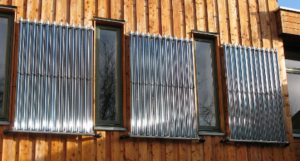Great Britain: Start of Consultation on RHI for Domestic sector
October 15, 2012
On 20th September 2012 the UK Government opened a consultation on their plans to expand the current non-domestic Renewable Heat Incentive scheme (RHI) to include the domestic sector. This intends that four core renewable heating technologies will be eligible for the domestic RHI: solar thermal, air source heat pumps, ground source heat pumps and biomass boilers. Although the proposal document gives some pieces of good news for solar thermal, there is a high degree of frustration in the UK industry that this consultation is causing yet another delay in the domestic RHI.
The proposal suggests that only flat-plate and evacuated glass tube solar panels will be eligible for the RHI, and that transpired solar thermal panels for façade installation will be excluded. This is due to the fact that they are not MCS certificated and are currently considered unsuitable as a domestic-level technology due to their larger size. The proposal document can be viewed on the DECC website. The closing date for responses is 7th December 2012. Responses can be submitted online at https://econsultation.decc.gov.uk/decc-policy/rhi-performance/consult_view or emailed to rhi@decc.gsi.gov.uk.
The DECC proposal document gives three pieces of good news for solar thermal. The first is that the tariff for solar thermal is intended to be at the highest end of the scale, at 17.3 Pound Stirling Pence per kilowatt hour (p/kWh) of heat generated (see table below). The second is that, in a recent survey of end-users part-funded by DECC, solar thermal had the fewest barriers to installation of all four technologies. The three main barriers for all renewable technologies were high upfront costs, the wish for more grants and funding, and the desire for shorter payback periods. In addition to these there were only two other major off-putting factors for solar thermal: namely, the amount of space required for installation and the length of installation time. In comparison, biomass was also considered to require too much space but also was considered to be difficult to use, disruptive during installation and aesthetically displeasing.
DECC are currently proposing a single-tariff system with the following tariff levels:
|
|
Biomass |
Air source heat pumps |
Ground source heat pumps |
Solar Thermal |
|
|
Tariff (Pound Stirling Pence /kWh) |
5.2 – 8.7 |
6.9 – 11.5 |
12.5 – 17.3 |
17.3 |
|
The third good news is that combinations of solar thermal systems with another eligible technology system are allowed, whereas other combinations without solar are excluded. For example, if a customer already has a biomass system then they would be able to apply for the RHI for a new solar thermal system. This exception is proposed because a separate calculation is needed for solar thermal systems based on independent assessments of their heat load factor. The proposal states that: “Multiple installations that include solar thermal will be permitted because very rarely can solar thermal systems meet the entire space heating and hot water needs of a property. Normally, they can only support a percentage of hot water needs. The benefit of installing a complementary solar thermal system is that it will perform the primary heat generator role for hot water which will allow the other system to concentrate more on space heating, thereby increasing the efficiency of that other system.”
A 7-year payment period is proposed which assumes a system life of 20 years. The RHI will be open to consumers looking to replace their current heating with one of the four eligible renewable technologies. However, there is also a backdated option proposed, with DECC intending to offer RHI support to consumers who have installed any of these technologies after 15th July 2009 as long as they are compliant with MCS standards. Other eligibility criteria proposed include consumers having completed what DECC are calling ‘green ticks’ – namely, other energy efficiency measures as laid out under the Green Deal, such as cavity wall insulation. More information about these requirements can be seen on page 44 of the proposal.
DECC estimate that on the basis of the upper range limits this could result in approximately 3.3 TWh/year (around 380,000 installations) of additional renewable heat by 2020.
There is a high degree of frustration in the UK industry that this consultation is causing yet another delay in the domestic RHI. Many believe the questions in the current consultation could have been answered already from previous consultations and the experience of the non-domestic RHI which is already available. It is a strong feature of the current consultation that no metering is proposed for solar heating systems and yet the theoretical ‘deeming’ methods of calculating energy performance do not yet existing for all combinations of equipment. Many are wondering if the much-hyped RHI will eventually become another grant scheme irrespective of component performance so as to reduce the administration overhead costs.


